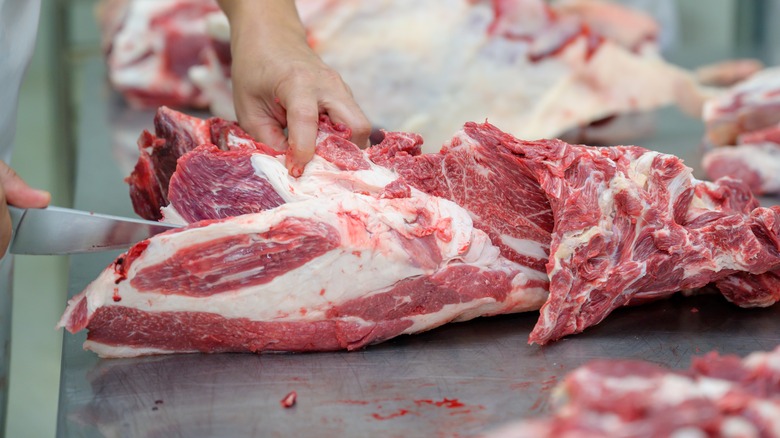Whole Foods' Meat May Not Be Antibiotic-Free After All
People shop at Whole Foods for a variety of reasons. Jeff Campbell, AKA The Grocery Store Guy, notes that these reasons include organic products containing natural ingredients and products, humane treatment surrounding animal products, the wide selection, and the respect and support the company gives its employees.
According to its corporate website, Whole Foods was founded in Austin, Texas in 1978 as Safer-Way. The chain's original mission was to offer consumers access to natural products that were free from chemical fertilizers and pesticides that were not found on most grocery store shelves at the time. In 1980, SaferWay merged with another store, Clarksville Natural Grocery, to become Whole Foods. Throughout the decade and into the 1990s, Whole Foods expanded and acquired other stores, eventually becoming a dominant name in high-end organic grocery chains.
Slate reports that it was in 2017 when Whole Foods underwent what many consider its biggest upheaval. The global sales behemoth Amazon purchased the grocer for $13 billion, drastically increasing the brand's presence in a segment of the market that it hadn't yet cornered. While there was much industry and financial sector speculation as to what this would mean for the grocery business, many individuals wondered if this would mean a decline in quality at their local Whole Foods, notes supply-chain publication Freight Waves.
A class-action lawsuit brought by southern California shoppers may shed light on what it claims are deceptive practices in how it labels some items.
Misleading meat
Whole Foods prides itself on what's not in its foods. Its website lists over 230 preservatives, coloring agents, flavorings, and other items that are banned from all items sold in its stores. That extends to its butcher shop, which, the chain claims, only sells meat that comes from animals untreated with antibiotics.
Not so, states the agriculture reform advocacy group Farm Forward and three individual plaintiffs who brought the suit, details Food & Wine. They claim that testing was performed on beef sold at Whole Foods and the results showed that antibiotic residue was detected. If proved true, that would mean Whole Foods' claim of "No antibiotics, ever" is tantamount to false advertising.
The negative implications of the accusations are many, reports Forbes. First, antibiotic overuse in humans and the livestock we eat can lead to elevated resistance, lowered immune defenses, and potentially even death. Furthermore, undisclosed antibiotic use can, at times, be a sign of inhumane treatment of livestock and other poor husbandry practices. Finally, consumers may be paying an inflated cost, as antibiotic-free meat routinely commands a higher price per pound.
This is not the first time Whole Foods has been on the hook for misleading its customers. In 2020, the U.S. Food and Drug Administration (FDA) issued a warning to the company to cease mislabeling products or accepting mislabeled items after it was found that over 30 different products failed to declare a major food allergen in the ingredients.

